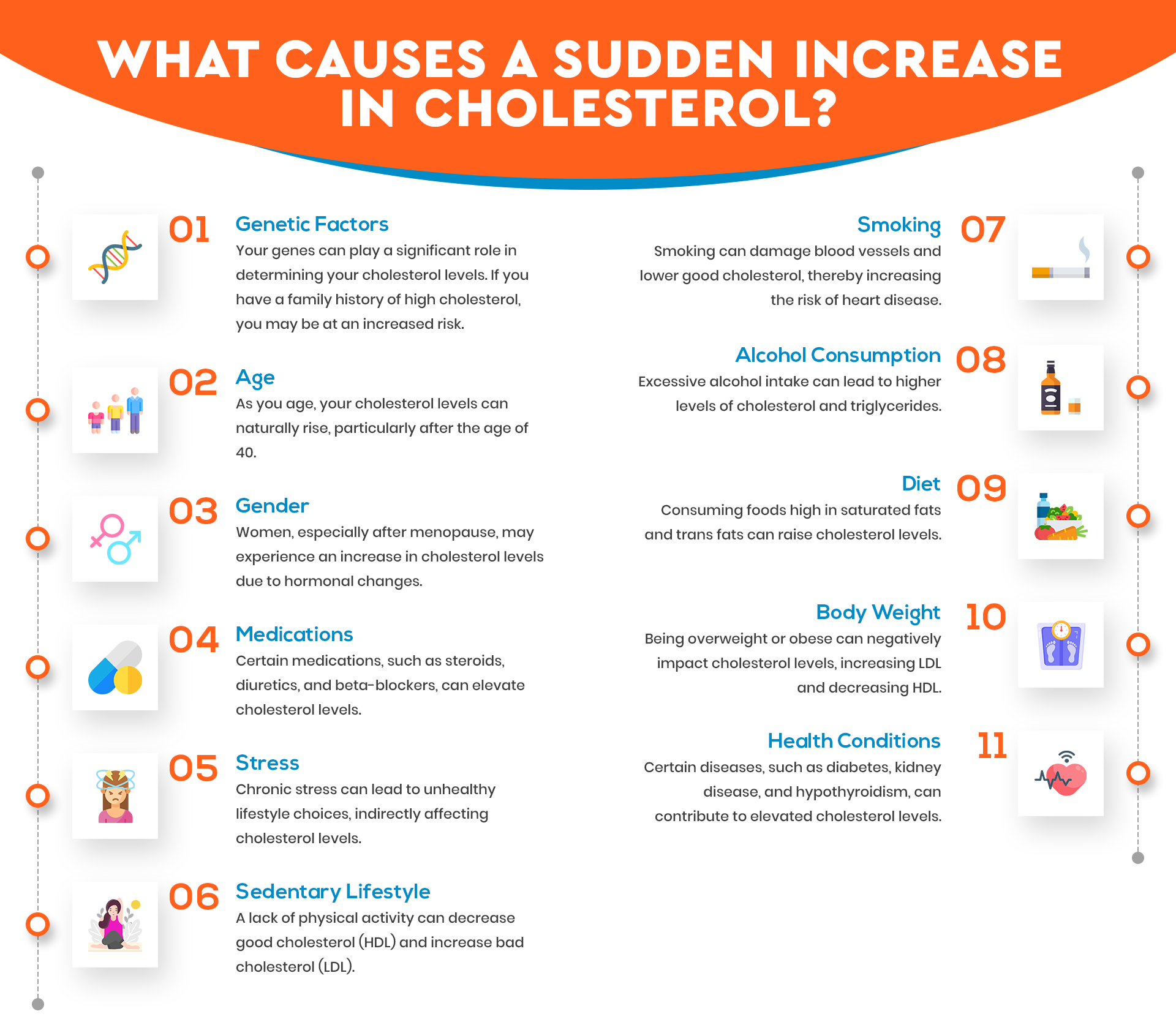
Cholesterol is a waxy substance that is found in every cell of our body. It plays a crucial role in various bodily functions, such as the production of hormones, vitamin D, and bile acids that aid in digestion. While cholesterol is essential for our body to function properly, an excessive amount can lead to health problems, particularly cardiovascular diseases. Therefore, it is important to understand cholesterol and its impact on our overall health.
What is a Sudden Increase in Cholesterol?
A sudden increase in cholesterol refers to a rapid rise in the levels of cholesterol in the blood. This can occur due to various factors such as poor diet, lack of exercise, smoking, and certain medical conditions. Monitoring cholesterol levels is crucial because high cholesterol levels can lead to the formation of plaque in the arteries, which can restrict blood flow and increase the risk of heart attacks and strokes.
-
Genetics and Cholesterol: The Role of Family History
Genetics can play a significant role in determining our cholesterol levels. If you have a family history of high cholesterol or cardiovascular diseases, you may be more prone to developing high cholesterol levels yourself. This is because certain genes can affect how our body processes cholesterol. Knowing your family history is important for cholesterol management as it allows you to take necessary precautions and make lifestyle changes to prevent or manage high cholesterol levels.
-
Age and Cholesterol: How Age Affects Cholesterol Levels
Age Group Total Cholesterol (mg/dL) LDL Cholesterol (mg/dL) HDL Cholesterol (mg/dL) Triglycerides (mg/dL) 20-29
123-199
62-130
40-80
40-160
30-39
135-211
71-148
35-85
45-199
40-49
147-233
81-158
35-88
50-239
50-59
157-244
85-163
40-94
50-239
60-69
160-246
89-167
40-94
50-239
70-79
162-248
89-167
40-94
50-239
As we age, our cholesterol levels tend to increase. This is partly due to the natural ageing process and changes in hormone levels. Additionally, as we get older, our metabolism slows down, making it easier for cholesterol to build up in our arteries. Monitoring cholesterol levels becomes increasingly important as we age because high cholesterol levels can significantly increase the risk of developing cardiovascular diseases.
According to BBC News, researchers suggest that people should check their cholesterol levels starting from their mid-20s. Read the news here: https://www.bbc.com/news/health-50648325
-
Gender and Cholesterol: Why Women are More Prone to High Cholesterol
Women are more prone to high cholesterol levels compared to men. This is partly due to hormonal changes that occur during menopause, which can be the reason for an increase in LDL cholesterol (often referred to as "bad" cholesterol) and a reduction in HDL cholesterol (often referred to as "good" cholesterol). Additionally, certain birth control methods can also affect cholesterol levels in women. It is crucial for women to manage their cholesterol levels through regular check-ups and lifestyle modifications to reduce the risk of heart disease.
-
Medications and Cholesterol: Surprising Drugs That Can Increase Cholesterol
It may come as a surprise that certain medications can increase cholesterol levels. Some examples include corticosteroids, beta-blockers, and diuretics. The GP prescribes these medications for various medical conditions such as asthma, high blood pressure, and heart diseases. It is important to discuss potential side effects, including changes in cholesterol levels, with your healthcare provider when starting any new medication. They can provide guidance on managing cholesterol levels while taking these medications.
-
Stress and Cholesterol: The Connection Between Stress and Cholesterol Levels
Stress can have a significant impact on our overall health, including our cholesterol levels. When we are stressed, our body releases stress hormones such as cortisol, which can increase LDL cholesterol levels. Additionally, stress can also lead to unhealthy coping mechanisms such as emotional eating or smoking, which further contribute to high cholesterol levels. Managing stress through relaxation techniques, exercise, and seeking support from loved ones is crucial for maintaining healthy cholesterol levels.
-
Lack of Exercise and Cholesterol: How Sedentary Lifestyle Affects Cholesterol
A sedentary lifestyle characterized by a lack of physical activity can contribute to high cholesterol levels. Daily exercise increases HDL cholesterol levels while lessens your LDL cholesterol levels. Besides, exercise also helps with weight management, which is another important factor in maintaining healthy cholesterol levels. Incorporating at least 30 minutes of moderate-intensity exercise into your daily routine can have a positive impact on your cholesterol levels and overall health.
-
Smoking and Cholesterol: The Negative Impact of Smoking on Cholesterol
Smoking not only damages the lungs but also has a negative impact on cholesterol levels. Smoking lowers HDL cholesterol levels, making it harder for the body to remove LDL cholesterol from the bloodstream. This leads to an accumulation of LDL cholesterol and an increased risk of cardiovascular diseases. Quitting smoking is crucial for cholesterol management and overall health. Seek support from healthcare professionals or support groups to successfully quit smoking and improve your cholesterol levels.
-
Alcohol and Cholesterol: The Surprising Link Between Alcohol and Cholesterol
While moderate alcohol consumption has some health benefits, excessive alcohol intake can negatively affect cholesterol levels. Heavy drinking can increase triglyceride levels, a type of fat in the blood which can contribute to high cholesterol levels. It is important to consume alcohol in moderation, which means up to one drink per day for women and up to two drinks per day for men, to maintain healthy cholesterol levels.
-
Diet and Cholesterol: Foods That Can Increase Cholesterol Levels
Diet plays a crucial role in managing your cholesterol levels. There are certain foods which increase cholesterol levels. These have higher amount of trans and saturated fats. These include red meat, full-fat dairy products, fried foods, and commercially baked goods. On the other hand, incorporating foods rich in soluble fiber such as fruits, vegetables, whole grains, and legumes can help lower LDL cholesterol levels. A healthy diet that focuses on lean proteins, healthy fats, and plenty of fruits and vegetables is essential for maintaining healthy cholesterol levels.
See the latest shocking news: Over a quarter of people in their 20s have high cholesterol in the UK due to consuming processed food on dailymail.co.uk: https://www.dailymail.co.uk/health/article-12714805/Over-QUARTER-20-somethings-high-cholesterol-Massive-study-lays-bare-true-scale-UKs-ill-health-shocked-experts-blame-societys-reliance-takeaways-processed-food.html
-
Obesity and Cholesterol: The Relationship between Weight and Cholesterol
Obesity is closely linked to high cholesterol levels. Excess body weight, particularly around the waistline, increases the risk of developing high cholesterol levels. This is because obesity can lead to insulin resistance, which affects how the body processes cholesterol. Losing weight through a combination of healthy eating and regular exercise is crucial for managing cholesterol levels and reducing the risk of cardiovascular diseases.
-
Medical Conditions and Cholesterol: How Certain Diseases Can Affect Cholesterol
Certain medical conditions can affect cholesterol levels. For example, diabetes can lower HDL cholesterol levels and increase triglyceride levels, leading to an imbalance in cholesterol levels. Hypothyroidism, liver diseases, and kidney diseases can also impact cholesterol metabolism. Managing these medical conditions through proper treatment and lifestyle modifications is essential for maintaining healthy cholesterol levels.

Conclusion: Importance of Cholesterol Management
In conclusion, there are several surprising factors that can cause a sudden increase in cholesterol levels. These include genetics, age, gender, medications, stress, lack of exercise, smoking, alcohol consumption, diet, obesity, and certain medical conditions. Understanding these factors and their impact on cholesterol levels is crucial for effective cholesterol management. Regular monitoring of cholesterol levels, making lifestyle modifications such as adopting a healthy diet and exercise routine, quitting smoking, managing stress, and seeking appropriate medical treatment are all important steps in maintaining healthy cholesterol levels. By taking control of our cholesterol levels, we can significantly reduce the risk of developing cardiovascular diseases and improve our overall health and well-being. If you have concerns about your cholesterol levels or need guidance on managing them, book a private GP consultation to receive personalized advice and support
See the latest news about high cholesterol levels on mirror.co.uk: https://www.mirror.co.uk/news/health/midlife-high-cholesterol-levels-could-31806357
FAQs
Cholesterol is a waxy substance that is found in the blood and is essential for the body to function properly. It is produced by the liver and is also found in some foods.
There are two types of cholesterol: LDL (low-density lipoprotein) and HDL (high-density lipoprotein). LDL is often referred to as "bad" cholesterol because it can build up in the arteries and increase the chances of getting heart disease. HDL is often referred to as "good" cholesterol because it helps to remove LDL from the bloodstream.
The normal levels of cholesterol vary depending on age, gender, and other factors. Generally, a total cholesterol level of less than 200 mg/dL is considered desirable. The levels of LDL have to be not more than 100 mg/dL, while the levels of HDL need to be greater than 60 mg/dL.
There are several factors that can cause a sudden increase in cholesterol, including genetics, diet, lack of exercise, smoking, stress, certain medications, and medical conditions such as diabetes and hypothyroidism.
Some surprising factors that can cause a sudden increase in cholesterol include sleep deprivation, menopause, pregnancy, and certain types of infections.
A sudden increase in cholesterol can be prevented by maintaining a healthy diet, exercising regularly, quitting smoking, managing stress, and taking medications as prescribed by a doctor. It is also important to get regular cholesterol screenings and to manage any underlying medical conditions that may contribute to high cholesterol.
High cholesterol can increase the risk of heart disease, stroke, and other health problems. It can cause plaque to build up in the arteries, which can lead to blockages and reduce blood flow to the heart and brain. This can result in chest pain, heart attacks, and strokes.
 Suite 4, 117A Harley Street London, W1G 6AT
Suite 4, 117A Harley Street London, W1G 6AT



